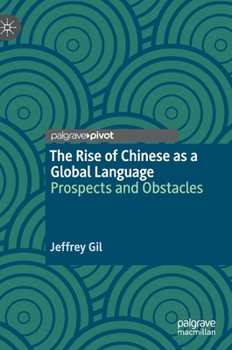The Rise of Chinese as a Global Language: Prospects and Obstacles
This book investigates the macroacquisition of Chinese - its large-scale acquisition and adoption for various purposes by individuals, governments and organisations - and the implications of this process for the future of English as a global language. The author contextualises the macroacquisition of Chinese within the global ecology of languages, then analyses the factors responsible for the macroacquisition of Chinese, showing, in contrast to most academic and popular commentary, that a character-based writing system will not stop Chinese from becoming a global language. He then articulates three possible future scenarios: English remaining a dominant global language, English and Chinese both being global languages, and Chinese becoming a global language instead of English. The book concludes by outlining directions for further research on the acquisition and use of Chinese around the world. It will be of interest to students and scholars with an interest in English as a global language, Chinese as a second/foreign language, language education policy, and applied linguistics more generally.





